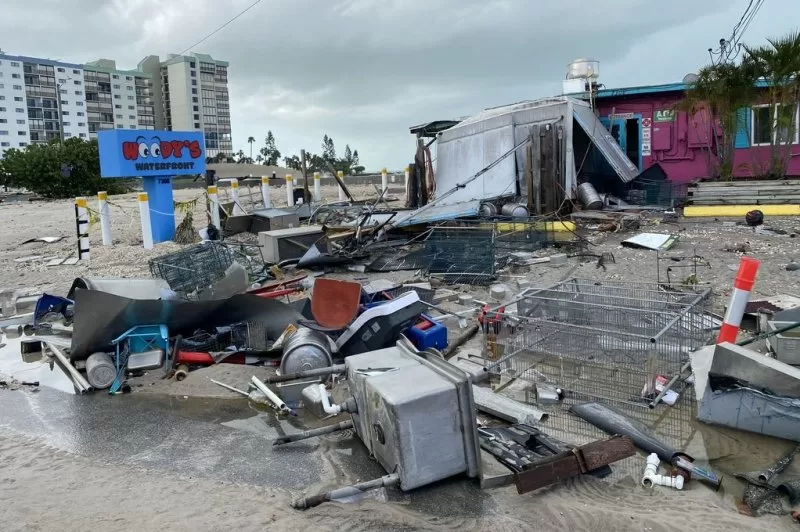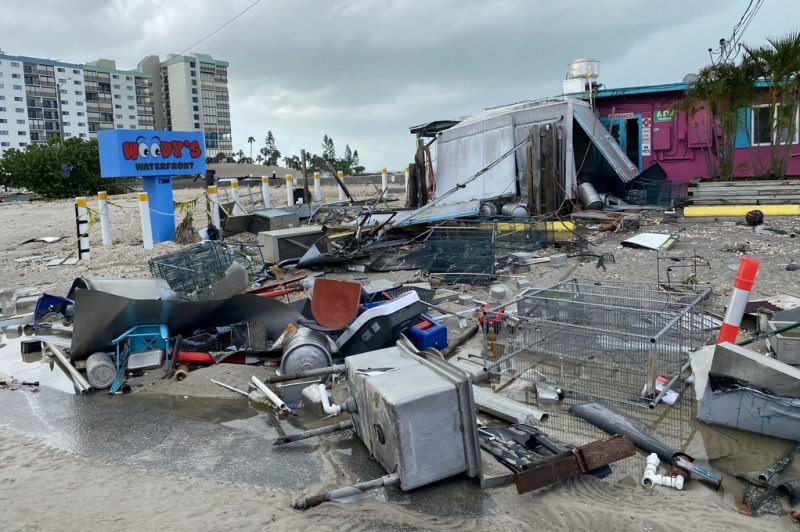1 of 3 | Hurricane Helene devastated St. Pete Beach, Fla., after making landfall Thursday night as a Category 4 storm with winds up to 140 mph. Photo via Pinellas County Sheriff’s Office/UPI |
License PhotoSept. 28 (UPI) — Hurricane Helene killed more than 50 and plunged more than 4 million into darkness with power outages that could last several weeks across 10 states.
The storm casualties are located in the southeastern states while the storm has degraded into a post-tropical cyclone that the National Hurricane Center says caused historic catastrophic flooding in the southern Appalachians area.
Many died when trees fell onto their homes while others died due to the severe weather in coastal areas in which evacuation orders were issued. Many sought shelter in their attics but were overwhelmed by the storm surge.
Local residents near endangered dams in Tennessee and North Carolina were evacuated to the potential for a failure causing catastrophic and life-threatening flooding.
Authorities on Friday successfully airlifted more than 50 people stranded by fast-moving floodwaters from the roof of Unicoi County Hospital in Erwin, in eastern Tennessee. The hospital is closed.
Rising waters topped the Lake Lure Dam in North Carolina’s Rutherford County, but the dam remained intact as waters began to recede by 6 p.m. Friday.
The storm forced the closure of Interstate 40 between Asheville, N.C., and Knoxville, Tenn., due to mudslides that will keep the interstate closed until at least early Saturday evening.
The storm also caused several pavement failures on a 4-mile stretch of 1-40 from mile marker for to the Tennessee border, the North Carolina Department of Transportation reported.
Helene “is one of the worst storms in modern history for parts of North Carolina,” Gov. Roy Cooper said.
The Nolichucky Dam in eastern Tennessee posed a danger of a catastrophic failure early Saturday morning, causing authorities to urge local residents to evacuate the area and move to higher ground.
Tennessee Emergency Management Agency Chief of Staff Alex Pellom said it worked with Tennessee Valley Authority “to confirm that the Nolichucky is not in that state anymore and that we have no dam failures that are reported at the moment.”
President Joe Biden approved advance emergency relief for affected areas in Florida, Georgia and North Carolina prior to Helene making landfall as a Category 4 hurricane with maximum sustained winds of 140 mph when it made landfall at 11:10 p.m. EDT in Florida’s Big Bend region.
Alabama, South Carolina and Tennessee also are among states approved for Federal Emergency Management Agency emergency assistance as of Saturday morning.
EMA officials are surveying the storm’s aftermath in Florida and other states to determine the extent of damage and destruction.
FEMA Administrator Deanne Criswell was on the ground in Florida. FEMA says it has more than 800 deployed staff in affected areas.
Early damage estimates in Florida indicate Hurricane Helene caused more damage than the combined totals caused by the recent Hurricane Debby and last year’s Hurricane Idalia.
The remnants of Helene have moved into Kentucky with several flood warning and advisories in effect across portions of the southern and central Appalachians through Saturday, the National Hurricane Center said.
More than 3 million were still without power in the United States as of Saturday afternoon, including more than 1 million in South Carolina, nearly 750,000 in Georgia, more than 680,000 in North Carolina and more than 422,000 in Florida, according to Poweroutage.us.
Flights have been disrupted including the hubs, including 430 cancellations so far Saturday at Charlotte Douglas International Airport and 134 cancellations at Hartfield-Jackson International Airport in Atlanta, according to Flight Aware. The Charlotte airport was No.; 1 in the nation and Atlanta airport No. 2 for most cancellations.

